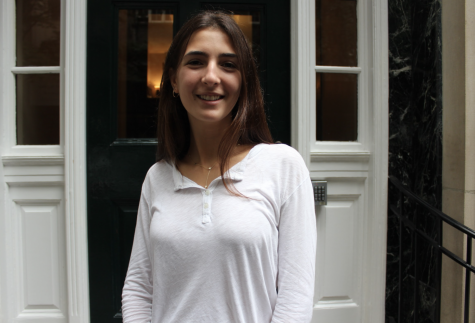Behind the Scenes at SFAC: November edition
This month’s Student Faculty Administration Committee (SFAC), composed of members of the G.O., student class presidents, grade coordinators and other faculty members, met on November 14, 2018 to discuss current concerns within the school and to propose ways to resolve them. Due to the absence of Rabbi Dov Pianko, the official SFAC chairman, the November meeting was officiated by Rabbi Slomnicki.
The meeting began with a follow-up from the previous month’s meeting primary discussion point: dress code. A solution was proposed by Ms. Krupka and Paola Mattot to send out a Google poll that would enable students to express their opinions on dress code and specify what changes they would like to see. These responses will be carefully analyzed and taken into consideration by the administration. Ms. Krupka specified that she “would be really interested to see how students would put the dress code into their own language.” She also noted that the administration would “take all of their input into account” after reviewing the data collected by the poll.
The next follow-up point addressed the issues surrounding the joint junior-senior shacharit minyan. There has been much controversy over whether combining the two individual grade minyanim has been beneficial. Many feel that it allows for a more meaningful tefilla experience, while others have expressed concerns with the fact that the dual-grade minyan is overly crowded. It was concluded that although juniors do not mind sharing a minyan, seniors feel that they should have the privilege to daven in their own minyan. “I actually like the combination,” Rabbi Stochel remarked, noting that “it feels more lively.” Ms. Krupka suggested a trial senior minyan, arranged by the senior class president, to determine whether or not separating the minyan would yield positive results.
New agenda items were presented as well. The first new agenda item proposed holding a second student teacher conferences during second semester. There were multiple suggestions as to when these conferences should take place, with some saying they should occur immediately after students received their first semester report cards and other saying they occur at the end of the third quarter. Junior Class President Gabi Potter ’20 noted that conferences should be held after students received their first semester report cards “so that students could reflect on their performance thus far and strategize for the upcoming semester.”
The meeting also addressed the moving of this year’s student-teacher conferences from a Friday to a Thursday. The reason for the alteration, according to administrators, was to relieve the pressure some students had previously felt to finish their conferences early and leave the building. The productivity of the conferences was also discussed. Ayelet Monas ’19, Associate Vice President of Operations, noted, “Many students just focus on getting through all of their teachers but maybe if they were allotted a specific amount of time per teacher their day would be a lot more beneficial and productive.” Another proposition was made to allow students to sign up for specific times to meet with teachers so that they would not have to waste time waiting on incredibly long lines.
The next item on the agenda was RamTEC, the new technology course offered to freshmen, sophomores and juniors. Junior Class President Lucy Doft ’20 said, “I did not realize going into the course how complicated it would be, because it is basically learning a whole new language.” Gabi Potter added that “junior year is already extremely difficult as it is and to have the stress of a new course makes the year an ever more challenging obstacle.” It was also pointed out that students with prior coding experience have a clear advantage over those who have no experience. Sophomore Class President Aaron Sokol ’21 suggested that “there should be separate tracks based on which students have prior knowledge of code in order to create a more productive experience for every student.” Monas noted that while it may be very important to teach coding at Ramaz, “it is nonetheless very difficult to take Hebrew and Spanish or French along with coding.” She then suggested that “students have the option to choose between taking coding or a foreign language.”
In the upcoming months, students should look forward to seeing changes in their everyday environment. Students are encouraged to email Dov in the days leading up to a SFAC meeting with issues they’d like to see resolved.

Sophia Kremer started writing for the Rampage as a freshman covering orientation and now serves as Co-Editor-in-Chief. Sophia plans to promote the paper...



